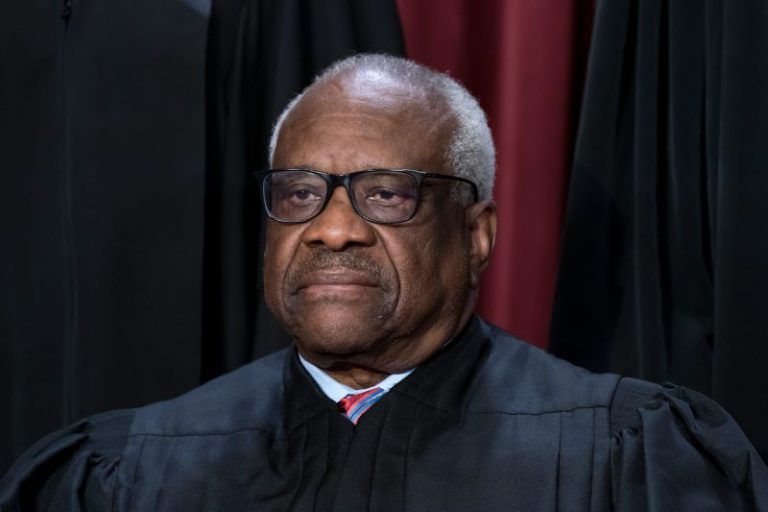Two Democratic U.S. senators announced Tuesday that they are seeking a criminal investigation of Supreme Court Justice Clarence Thomas over gifts of travel, a loan for a recreational vehicle and other benefits he received from wealthy benefactors.
Sens. Sheldon Whitehouse (D-R.I.) and Ron Wyden (D.-Ore.) said they sent a letter to Attorney General Merrick Garland last week requesting he appoint a special counsel to probe whether Thomas violated ethics, false statement and tax laws.
The action marks a significant escalation in efforts by Democratic senators to address ethics controversies related to Thomas and the court in recent years. Whitehouse’s staff said it was likely the first time anyone had requested a special counsel investigate a Supreme Court justice. Whitehouse sits on the Senate Judiciary Committee, while Wyden chairs the Senate Finance Committee.
Jeremy Fogel, a former federal judge and executive director of the Berkeley Judicial Institute, said the Justice Department has the legal authority to appoint a special counsel to investigate Thomas, but whether it would is another matter. “Inevitably it would be seen as political retribution for rulings the justices made that they don’t like,” he said. “I just don’t know how you get out of that box.”
The Justice Department declined to comment on the request.
Special counsels are generally appointed when the attorney general wants to assure the public that a sensitive investigation will be conducted fairly and free from political considerations; Garland has appointed three special counsels during his tenure, to oversee investigations involving former president Donald Trump, President Biden and the president’s son, Hunter Biden.
“We do not make this request lightly,” Whitehouse and Wyden said in a statement. “The evidence assembled thus far plainly suggests that Justice Thomas has committed numerous willful violations of federal ethics and false-statement laws and raises significant questions about whether he and his wealthy benefactors have complied with their federal tax obligations.”
Thomas and his attorney, Elliot S. Berke, did not immediately respond to requests for comment, but Berke has said previously that Thomas tried to comply with financial disclosures of gifts and travel as they existed at the time.
“Justice Thomas has always strived for full transparency and adherence to the law, including with respect to what personal travel needed to be reported,” Berke said in a statement last year. He described any failures to disclose travel as “strictly inadvertent.”
Whitehouse and Wyden said they wanted a special counsel to examine a $267,000 loan Thomas used to purchase a luxury motor coach in 1999, adding that they have not received adequate answers from Thomas about how he handled the matter. An investigation by the Senate Finance Committee concluded a substantial portion of the loan from Thomas’s friend and businessman, Anthony Welters, was forgiven in 2008. The committee found Thomas failed to report the loan on his financial disclosure forms, raising questions about whether he reported it as income on his taxes as required by law.
Thomas has not previously commented publicly on the loan, but Welters told The Washington Post last year that he believed Thomas had “satisfied the loan.”
The senators also want the special counsel to investigate multiple instances of jet travel, yacht trips, home renovations, tuition, luxury sports tickets, lodging and other gifts that Thomas did not disclose on his annual financial forms. The gifts were reported in a series of articles by ProPublica last year. Many of the items were paid for by Harlan Crow, the Texas billionaire, Thomas friend and major Republican donor.
In addition, the senators want the special counsel to probe $25,000 in consulting fees that were directed to Thomas’s wife, Virginia “Ginni” Thomas, by conservative judicial activist, Leonard Leo. The payment was first disclosed by The Washington Post last May. Some ethics experts said it raised questions about whether Thomas should have recused himself from certain cases. Neither Clarence nor Ginni Thomas responded to requests for comment about the payment at the time.
The failure to disclose the gifts and payments may have violated a federal law requiring government officials to disclose gifts, loans and other benefits, Whitehouse and Wyden said. They also want to know if Thomas’s benefactors paid gift taxes, and whether Leo’s payment to Ginni Thomas was part of a coordinated gift program or required any additional disclosures by the justice.
Last month, Whitehouse and Rep. Hank Johnson (D-Ga.) asked the officials with the U.S. Judicial Conference, which oversees judicial ethics issues, to explain how they were handling the disclosures about Thomas. They have yet to receive an answer. The lawmakers had previously asked the conference to refer Thomas to the Justice Department for potential ethics violations.
The Senate Judiciary Committee revealed last month that Thomas took three flights paid for by Crow between 2017 and 2021 that he did not disclose. Berke said Thomas was not required to disclose the travel because it happened before the high court clarified its own ethics rules to specify that free travel must be reported as a gift. Thomas reported three trips on Crow’s jet during 2022, after the policy change.
The justice also revised his 2019 financial disclosures last month to reflect lodging and other expenses paid for by Crow during trips to Bali and a club in California.

